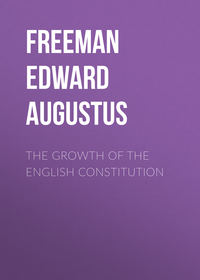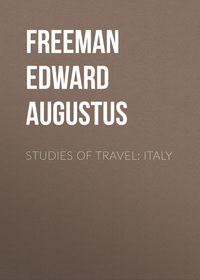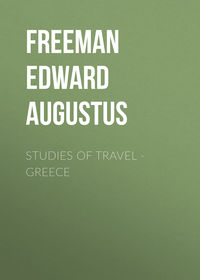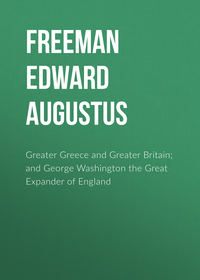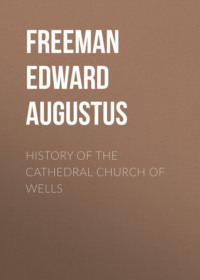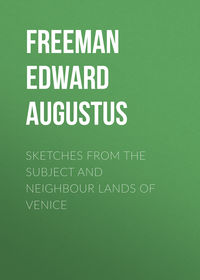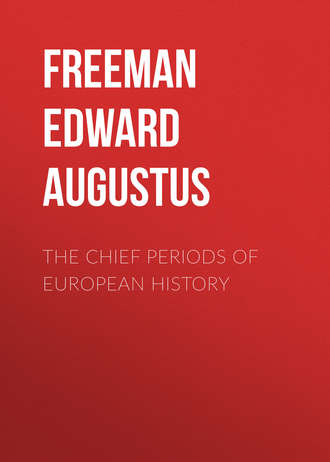 полная версия
полная версияThe Chief Periods of European History
I have been drawn on, almost in spite of myself, to paint somewhat of a picture of the main features which distinguished the Eastern and Western Empires after they were finally split asunder by the act of the year 800. But a lecture on the Divided Empire ought to do something more. It ought not to shrink from the more prosaic task of sketching the main facts of the story in their order and of speaking a word of warning against a few notions and forms of speech which are likely to mislead. But it may not be useless to run with a swift step through the revolutions of several centuries, and here and there to throw in a needful caution. And to understand the Divided Empire, it is first needful to cast a glance at the Empire before it was divided. We have to hasten as far as the thirteenth century, a century almost as full of destiny as the fifth, but to the fifth we must first again look back. We have seen that at its beginning the formal boundaries of the Empire had hardly given way; Theodosius had reigned over at least as wide a dominion as Jovian; and his dominion had passed to his sons reigning as Imperial colleagues at Constantinople and at Ravenna. In the course of that century the Vandal passes through Gaul into Spain; he founds a Spanish realm, and presently forsakes it for a somewhat more lasting dominion in Africa. The Alan, marching at his side, founds a yet more momentary dominion in Spain and presently vanishes from the face of the earth. The third in that great march, the Suevian, founds his Spanish realm also and keeps it longer than either. At the end of the century he still holds his north-west corner; but the rest of the peninsula is in the hands of the West-Goth, whose mighty kingdom stretches over Gaulish and Spanish ground from the Loire to the pillars of Hercules. The Burgundian has spread himself from his old seat on the Rhine to the mouths of the Rhone and the haven of Massalia. But the Roman name has but lately died away from central and northern Gaul. Cut off from either centre of Imperial rule, a Roman land, some say, strange as the title sounds, a Roman kingdom, has lingered on between Seine and Loire, to yield at last to the advance of a Teutonic people who have long played a secondary part in the affairs of Gaul, but who are now, in the short life-time of a single enterprising king, to spring to a place in the world alongside of the Roman and the Goth. The Frank has begun his march, eastward, westward, southward, northward. For a moment he is the heathen lord of Catholic subjects who preferred the worshipper of Woden to the follower of Arius; he is presently to change into the one Catholic power of the whole world, the eldest son of the Church, looked to through all Gaul as the deliverer of Catholic lands from heretical rulers. And, what concerns us more than all, while Gaul, Spain, Africa, have passed away from the Empire, Italy and Rome itself have, in all but name, passed away with them. One barbarian patrician has yielded to another; Theodoric watches over Italy as no Cæsar had watched over it for many a year. A few years more, and his rule stretches, under one title or another, over the whole western half of the Mediterranean lands of Europe. Yet the Roman name, the Roman power, lives on in its Eastern half; the one Emperor of the Romans still holds his throne in the Eastern Rome, keeping but the shadow of a barren title over his elder capital, but biding his time to make that shadow a reality at the first favourable moment.
So far have we followed the memorable fifth century, the century, I repeat, in whose first years, if at any time, modern history begins, the century at whose end the existing nations of Europe are still not in being, but at whose beginning they have taken, so to speak, the first feeble steps towards coming into being. Let us now glance at the hardly less memorable sixth century, memorable in another way from the fifth. The sixth century is not a creative, but rather a reactionary age, an age which does much to hinder the growth of new elements, and much to bring back old elements to a place and a power which they had lost. Of all ages in history the sixth is the one in which the doctrine that the Roman Empire came to an end at some time in the fifth sounds most grotesque. Again the Roman armies march to victory, to more than victory, to conquest, to conquests more precious than the conquests of Cæsar or of Trajan, to conquests which gave back Rome herself to her own Augustus. We may again be met with the argument that we have ourselves used so often; that the Empire had to win back its lost provinces does indeed prove that it had lost them; but no one seeks to prove that the provinces had not been lost; what the world is loth to understand is that there was still life enough in the Roman power to win them back again. I say the Roman power; what if I said the Roman commonwealth? It may startle some to hear that in the sixth century, nay in the seventh, the most common name for the Empire of Rome is still “respublica.” No epithet is needed; there is no need to say that the “respublica” spoken of is “respublica Romana.” It is the Republic which wins back Italy, Africa, and Southern Spain from their Teutonic masters. It is the Republic which beats back from the ransomed lands the new attacks of the Frank and the Alaman. If Gregory the Great stoops to flatter the murderer Phocas, he warns him also – strange as the words sound to us – that, while the kings of the nations rule over slaves, the Emperors of the Republic rule over freemen. We must indeed beware of bringing in ideas which belong wholly to modern controversy; there is nothing in the word “respublica,” nothing in the word “commonwealth,” nothing in the use of those words down to a very recent date, which shuts out the possibility of a commonwealth having a prince, Emperor or king, as its chief ruler. The point of the employment of the word lies in this, that it marks the unbroken being of the Roman state; in the eyes of the men of the sixth century the power which won back the African province in their own day was the same power which had first won it well nigh seven hundred years before. The consul Belisarius was the true successor of the consul Scipio. Again the Roman power stretches from the Ocean to the Euphrates; the mighty volume of the Roman law is unrolled alike for the Syrian and the Spaniard. The whole Mediterranean coast is again the seaboard of Rome, save where the West-Goth still keeps his hold on Septimania and Northern Spain, save where the Empire has itself yielded the coast from Rhone to the Alps to the Frankish lords of Gaul who have wiped out the power of the Burgundian and cut short the West-Goth on Gaulish soil. The common teaching on these matters is so wretched that I believe we all of us feel – I still feel myself – a certain feeling of strangeness and incongruity at the mere picture of the revived Empire of the sixth century. Or if strangeness and incongruity are words too strong, we at least feel that it is a truth which needs asserting, asserting, it may be, till times seventy times seven, in the ears of the unlearned and unbelieving. To look on it, as the men of the time looked on, as the restoration of a lawful order of things which had been violently interrupted is one of the hardest of historic lessons.
But there is no popular delusion which does not contain some measure of truth, however disguised and distorted. No way of speaking can be more misleading than that which is still employed, even by some eminent scholars, of speaking of the Empire of Justinian, of the armies of Justinian, as Greek. It is not only formally wrong, but it does not in any way express the facts. Even before the reconquest of the West, the Greek element was far indeed from being the exclusive, it was hardly the predominant element in the Empire; and to apply the name to the enlarged Empire, largely inhabited by a Latin population, which Justinian passed on to his successors is more misleading still. And in the army above all, made up from all manner of warlike tribes within and without the Empire, the proportion of men who were in any sense of Greek birth, even the proportion of men to whom Greek was their native speech, must have been small indeed. Yet we have the memorable fact, showing itself in the narrative of Procopius and in the very beginnings of English literature, that both on Gothic and on English lips the subjects of the Emperor who reigned at Constantinople were spoken of as Greeks. No wonder; the Goths, marching to and fro in the eastern peninsula, must have heard more Greek spoken than any other tongue; so must the first of English travellers, be the travels of the singer of the song real or imaginary. And the name was given almost by a prophetic instinct, as if the Goth, unfettered by Roman traditions, saw that an Empire of which Byzantium was the head, if not Greek already, must some day become such. What if Justinian had seen that fact and had acted on it? What if he had grasped his position as before all things lord of the great eastern peninsula of Europe and the great western peninsula of Asia, lord that is of lands still partly Latin, but far more widely Greek? What if he had given his whole mind to the defence of his northern frontier against Slavonic and Hunnish invaders, and had left the Teutonic and Latin elements in Italy, Spain, and Africa to settle themselves as they settled themselves in Gaul? It may well be that such a course would have been the wiser; looking at the matter with the light of thirteen later centuries, we are strongly tempted to say that so it would have been. But we must remember that the light of those thirteen later centuries could give no help to the minds of men whose destiny had fixed them in the sixth century. As Justinian or any man of his age must have looked on the world of the sixth century, an Emperor of the Romans, reigning in the New Rome but shut out from the Old, must not only have been tempted by every feeling of ambition, he must have honestly felt it as the highest of his Imperial duties, to win back the lost lands of Rome, to win back Rome herself, for the Roman commonwealth of which he found himself the head.
The great revival of the Empire in the sixth century was but the first of a long series of revivals which marked the history of the power whose head was at Constantinople down to its latest stages. In its long annals, the successors of Cæsar and Trajan, the men who extend the borders of the Empire over new lands, are far from wholly lacking; the successors of Valentinian and Belisarius, the men who win back the lost lands, are never lacking down to the last generation of the Palaiologoi. But the first and greatest burst of this power of springing to new life was that which came while the Empire still was one, when Belisarius, deliverer of Africa and Sicily, sent the keys of ransomed Rome to her own Emperor. True, as we have seen, a large part of Italy was lost again before the century was out; the Spanish province passed away early in the next century; but the successors of Justinian still ruled at Carthage till the last years of the seventh century; they still ruled, in name at least, at Rome till the last year of the eighth. No confusion can be greater or more misleading than that which looks on the Empire of Tiberius, Maurice, and Heraclius as something strange and anomalous, something to be labelled as Eastern, Byzantine, perhaps Greek, to be called anything in short but its true name of Roman. Never, I would say to all of you, use the words “Eastern” or “Byzantine,” till there is something Western to oppose to them. You may distinguish Nikêphoros as the Eastern Emperor as opposed to the Western Emperor Charles; but never speak of Maurice or Heraclius as anything but the sole Roman Emperor that he was. Still in the days of Heraclius the process begins which was to leave the Empire of Nikêphoros, if not a Greek power, at least a power fast hastening to become Greek. The mightiest of Imperial warriors, he who overleaped the fame of Trajan to renew the fame of Alexander, the deliverer of Rome, the conqueror of Persia, the man who brought back the holiest of Christian relics from its heathen bondage, lived to be the man who saw Syria and Egypt lopped away from his Empire, who saw the Holy City that he had redeemed pass away into the hands of misbelievers yet more terrible than those whom he had overthrown. It may be that the Empire gained even by these fearful losses; it is plain that after its Oriental and its Latin provinces are lost, it begins to put on somewhat of the strength of a national power, even though that power had no thought of its own nationality. It may even be that the great Isaurian Emperors of the eighth century let the remnant of Latin Italy slip from their hands almost without an effort, because they saw that a dominion which was becoming foreign to the great mass of the Empire was no true source of strength. To reign from Hæmus to Tauros, to be lord at Trebizond and at Syracuse, to beat back the Bulgarian in Europe and the Saracen in Asia – it was no mean task, no easy task, which fell to the lot of the “effete” “Greek of the Lower Empire;” he might well deem that he had work enough to do in the lands which naturally looked up to the New Rome, and that he might leave the Old to set up again for itself, if such was its own good pleasure.
Set up for itself it did, as we have already seen; but it set up for itself mainly to deck a German king and a German kingdom with its own Roman memories. Charles, like Theodoric, had called into being a system which it needed himself to work. He could be at once German King and Roman Cæsar in deed as well as in name. His immediate successors found it hard to be either. By the end of the ninth century the great Frankish dominion was broken in pieces; the crown of the Western Rome passed, now to a prince of Italy, now to a prince of Germany, now to a prince of Gaul. Under the second Lewis Italy came nearer to forming an united and separate realm than she did at any other moment between Theodoric and Victor Emmanuel. For that moment there seemed a chance – that is, we, a thousand years after the time, see that there was a chance – that there might be, not a German, but an Italian Empire of the Western Rome, to match the Greek Empire of the Eastern Rome. But it was fated that the traditions of the Western Rome should neither abide in Italy with Lewis and Berengar nor pass into Gaul with Charles the Bald. The German King, the Saxon King, the first of the Ottos, came down to receive the crown of Rome as a deliverer, to pass it on to a grandson who seemed for a moment to have the mission, not only of reviving the Roman power, but of making the elder Rome herself once more the local seat of Imperial dominion.
Vivo Ottone tertio,
Salus fuit populo.
But the “mirabilia mundi” passed to an early grave; the true work of his house was, not to restore the local power of Rome, but to fix that the Western Empire of Rome, the now Holy Roman Empire, should be, down to the moment of its last shadowy being, a Roman Empire of the German nation. It is that Empire, the Empire of the Ottos, the Henries, and the Fredericks, the Empire to whose worthiest chief men could pay their tribute of renewed Saturnian song;
Princeps terræ principum, Cæsar noster, ave,
Cujus jugum omnibus bonis est suave;
the Empire whose true power and glory was buried in the grave of “Fridericus stupor mundi,” but whose shadow lived on to inspire the heart of Dante, whose traditions lived on to win for the Imperial name one flash of seeming might in the days of Henry of Luxemburg, one flash more dazzling still in the days of that Charles who was the last to take its crown, though not in the old crowning-place of the first – it is this great fact of all European history, the fact whose greatness has been so well proclaimed by a scholar and statesman of whom this University is proud, which has now to divide our thoughts with that other side of the divided Roman power whose annals, for some ages at least as glorious, were wound up by a far more glorious end. As the warrior’s death of the last Constantine is another tale from the self-abasement of the last Francis, so in the brighter days of either power we may claim for the Empire of the Macedonians at least an equal place in the world alongside of the Empire of the Old-Saxons. While the third Otto was dreaming of the coming glories of the Old Rome, the second Basil was filling the New with the trophies of all lands from the Danube to the Orontes, from the Pharos of Messana to the roots of Caucasus. And let us pause for a moment to think once more what might have been. What if the Slayer of the Bulgarians had failed in his sternest struggle, when he and his Empire strove, year after year, locked tight in the death-grapple with rivals worthy of them? What if Samuel of Ochrida, and not Baldwin of Bruges or Mahomet of Brusa, had made his way within the walls of Constantinople, on an errand matching the errand of the first Otto in the West, to make the Imperial city abide for ever a seat of Christian rule, as the head of a Roman Empire of the Slavonic Nation?
One question now comes which might well have come sooner. In the days of the Divided Empire, when Europe and Christendom had two rival heads, how did either bear itself towards the greatest work of all, the special calling of Europe and of Christendom? How did the Cæsars of East and West bear themselves in the Eternal Question of the world’s history? The Persian victories of Heraclius were the last work, the last glories, we might almost say the greatest and noblest glories, of the undivided Empire. The next moment the Eternal Question put on that more fearful and more abiding shape which it still bears in our own day. The two Semitic creeds, the most antagonistic of all creeds simply because they have so much in common, the creed of Rome and the West, the creed of Arabia and the East, stood forth as new badges for each side, badges under which each side drew new life for the eternal struggle. Syria and Egypt, which had little to lose by falling away, fell away, as we have seen, in a moment; Latin Africa, which had much to lose, fought on for sixty years; the Roman strove more manfully for Carthage than the Goth strove for Spain and Septimania. But Africa was lost for ever; the unconquerable lands of northern Spain, the Tzernagora of the West, bred up a line of heroes to win back their own land from the intruder. The Frank, Hammer in hand, crashed the enemy before he crossed the border stream of Loire; and the first king of the new line won a higher glory than that of Frankish king and Roman patrician by ending the short rule of the Mussulman around the temple and the arena of Nîmes and on the tower-crowned hill of Carcassonne. Nor did the New Rome fail in the work; vainly did the last companions of the Prophet strive to win the fulfilment of his promise that the sins of the first believing army that entered the city of the Cæsars should be forgiven. As the Persian had been beaten back in the days of Heraclius, so was the Arab beaten back in the days of his descendants. Again he came; but the strong arm of the Isaurian Leo again saved the New Rome and the whole world of Christendom. The strife of the old days came again in Sicily; again Europe and Africa, again Aryan and Semitic man – Aryan men who spoke the tongue of Greece and Semitic men who ruled where Carthage had twice been – strove, in the cycle of the ages, for the island that was called on to be the meeting-place, the battle-field, of creeds and tongues and nations. Sicily was lost, yet Tauromenion on its height, looking down on the Ebbsfleet of Hellenic Sicily, held out for almost a hundred years; short indeed were the two intervals when the Infidel could boast himself master of the whole of that memorable island. If Tauromenion and Rametta fell at last, the sword of George Maniakês was soon to be sharpening; if Syracuse was won and lost again, the sword of Norman Roger was already sharpening for a deliverance more abiding.
Long and stern indeed was the strife which the Romans of the East had to wage to guard Tauros against the Saracen, while they had to wage a strife no less abiding to guard Hæmus against the Bulgarian. But as long as the Saracen alone had to be striven against, the work was done. Then came the day of reconquest, the days of Nikêphoros Phokas, of John Tzimiskês, of the awful Basil himself. The eleventh century begins as the greatest century of Byzantine history; before its end a new enemy has come; the Asiatic side of the Eternal Question has passed to a new champion; what the Arab failed to do, the Turk has begun to do indeed. The Romania of Asia has ceased to be a Christian land of the Empire; but a Roman land it seems hardly to cease to be, while Nikaia, birthplace of Christian orthodoxy, destined in after times to be the seat of the most vigorous of Eastern survivals of the Roman power, holds the throne of a Mussulman, the throne of a Turk, but a Mussulman and a Turk whose style is Sultan of Rome.
Hurried indeed is the glance that is all that we can take of the Empire thus split asunder between two rivals. The true power and greatness of both come to an end in the great age of creation and destruction, the thirteenth century of our æra. In the West, the Roman Empire and the German kingdom do not indeed come to a formal end, but they lose their ancient place beside the grave of Frederick the Second. In the East, the Empire, as a local power, gains a new lease of national strength, but it loses its œcumenical position when the Latin reigns at Constantinople, when the Ῥωμαῖος, however we translate his name, reigns beyond the Bosporos at Nikaia. Thus far we have had still to deal with the true and ancient substance of the Empire, even if parted asunder into two bodies. We shall have next to speak of powers which kept on its name and its traditions, but which in sober truth we can hardly look on as more than its shadows and survivals.
LECTURE V.
SURVIVALS OF EMPIRE
I drew a distinction in my last lecture between two stages in the dying out of the Roman power and its traditions. There were times when the two Empires of East and West, however changed their character from what it had been in earlier times, however far they had gone, the one to become Greek, the other to become German, might still be held to keep the essence of their old Roman being. And there were later times when the names and traditions of Rome still lingered on, but when they could not be looked on as more than shadows and survivals. I wish it of course to be understood that this division between these times is an arbitrary line of my own drawing. In the West at least it does not answer to any such marked epoch as the event of 800, the event of 1453, the event of 1806. I drew the line at the death of Frederick the Second. We shall, I think, all allow that, if Frederick the Second represents a state of things which had become very unlike the state of things under Trajan or even under Constantine, Francis the Second represents a state of things at least as unlike the state of things under Frederick. But it does not follow that, if a line is to be drawn, every one would draw it at the death of Frederick. It might be said that the Empire had become a mere German state before his day, that the position of Frederick was exceptional, that his importance in Italian affairs really belonged to the King of Sicily and not to the Emperor of the Romans, that the career even of his grandfather showed that in his time the Roman claims of the German kings had become thoroughly unreal, and rested wholly on the strength of their German armies. Another might draw the line much later; he might say that the true Empire passed away when an Emperor, a third Frederick most unlike the First and Second, took his crown for the last time before the altar of old Saint Peter’s. He might draw it when that Frederick’s son took an Imperial style, though to be sure with a qualifying adjective, without any show of Imperial crowning. Or he might draw it when the last Imperator, successor of the first Imperator electus, took the crown of the Empire, not before the altar of Saint Peter at Rome, but before the altar of Saint Petronius at Bologna. The last is indeed an epoch-making moment; Charles the Fifth does seem to wind up with some fitting dignity that Imperial line which began with Charles the Great. And as the last Emperor, as distinguished from Emperors-elect, he does truly wind it up. The gap between Charles and Ferdinand is in truth a wide one. But surely there is a still wider gap between Frederick the Wonder of the World and princes like William of Holland, Richard of Cornwall, and even, when looked on from the Imperial side, as Rudolf of Habsburg. Rudolf is indeed different from William and Richard; he is great and famous as German King; but the line of Emperors knows him not. The fact that the man whom we may call the restorer of the German kingdom never sought the Imperial crown seems of itself to point to the reign of the last Emperor before him, even if that Emperor had not been Frederick the Second, as the time when the Empire, as a power in itself, and not simply as a lofty title, a mighty memory, came to an end. Under Charles the Fifth the Empire seems to spring again to the fulness of its ancient power; but his abdication and death revealed a truth. When his titles of Empire passed to Ferdinand and his European position passed to Philip, it became clear that, however the titles of Empire might make the position of Charles more brilliant, his might had not really been the might of the Empire, but the might of Burgundy and Castile. The line, wherever we draw it, is an arbitrary one, unmarked either by formal changes or by events of the first greatness. I think we shall all agree that the Peace of Constanz and the Peace of Westfalia are the acts of a power which in the earlier time still kept much of a really Roman position, while in the later time all truly Roman character had passed from it. The change between the two states of things is gradual; at what point between the two we choose to draw the line is largely matter of opinion, one might say rather matter of taste or of feeling.


